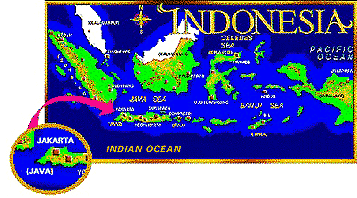
By Melissa Lauber

In Indonesia, the fourth most populated nation in the world, the ancient art of wayang puppet shows is treasured. These shadow puppets enact myths that are older than time and help to shape the identity of the island nation's 180 million people. This sacred shadow play also serves as a metaphor for violence that has erupted recently, affecting many Christian churches.
In the shadow puppetry, the puppeteers are invisible. Only their manipulations, cast in mysterious black silhouettes, are visible to the audience.
This is the drama that has been enacted in Indonesia recently:
It is a drama drenched in fear, hatred and violence. Throughout it all, "the police and army have suspiciously disappeared or backed off from the riots. Some say that this 'turning a blind eye' has roots in efforts to cause political trouble on a more national level. Others say it is rooted in a hatred for Christians. All I know is it looks very bad. It looks planned," said a Village Life correspondent.
In releases to and from the religious community, both Christian and Muslim leaders are trying to avoid charges of persecution. That would be "a narrow and dangerous position to take. It would polarize public opinion and would neutralize all the efforts that are now being made by religious leaders to calm their respective followers," one email release said Jan. 2.
Many of these religious leaders say they do not feel free to speak out against the government. However, in email correspondence with Village Life, they have said they agree with news reports that poverty and oppression lie at the foundation of the violence. They find their sentiments expressed in articles like one in the Strait Times which read: "political and religious analysts say Christian churches become targets for mob violence primarily for economic and social reasons, with Christians usually the more affluent members of the community."
According to this newspaper, the December rioting is a result of the people of Tasikmalaya, famous for their handwoven cloth, reacting to the influx of modernization and the frustrations that it entails.
It wasn't until the early 1990s that a department store came to the town. The saundara santris, traditional Muslim merchants, are having a difficult transition as "some time-honed traditions also died, and a whole social class with them."
The ethnic Chinese have become victims "because they are easier targets than the government. Christians too were perceived to be another group taking advantage of the decline of the saundara santri class, and easy victims."
Others point to more dangerous motives. Indonesia's Religious Affairs Minister Tarizi Taher charged the rioting was "the result of engineering by irresponsible elements," who have "incited Muslims to destroy the existing order."
In the "Chrysxtians in China, Asian Minorities and Hill Tribes Discussion-mailing List" (CAHT-L) on the Internet, one correspondent recently wrote: "Ultimately Indonesia will be controlled by the mob if the only means of expressing discontent and manifesting political power is by bringing people onto the streets. As long as the political system is closed and there are large numbers of people living in poverty there will be an escalation of violence. Christians will continue to be targets because by religion, and often ethnicity, they are seen as aliens. In the end we must pray for democracy in Indonesia."
Phillip Lim, a Methodist communications official from Singapore, who is closely monitoring the situation agrees. Yet he yet cautions "nothing is quite so clear about the actual motives. Please do not try to simplify the causes."
What is becoming clearer, is the intentional Christian response to the violence. In all email messages, Village Life correspondents have asked for prayers, reconciliation and forgiveness. One email message said "victims have fallen," and added, many Christians in Indonesia "will not be hesitant to lay down their souls under the cross if the situation demands." However, the key to this crisis, the correspondent said, is for "Christians to live for God glory and kingdom," by being "courageous, yet gentle and wise."
To demonstrate this, Lim quotes a letter he received shortly after the rioting. A friend from Tasikmalaya wrote: "I had a few minutes cleaning up glass with one of the assistant pastors -- baby born on Sunday, windows busted out on Thursday, thief entered empty house Friday night -- he's had a full week. 'But they can't take my Jesus' he says!"
That's a thought that's hard to enact in the silhouettes of an Indonesian puppet show. But for many Christians in Indonesia, it's a sentiment that can shed great light into the darkness of tomorrow's violence which he is certain will come, even as he prays for peace.
Related Sites
The following links will take you to Web sites related to this article. As these sites are not part of Village Life News Magazine, Village Life does not endorse these sites, nor does it have any control over the content or availability. Clicking on these links should create a new browser window so you can easily return to Village Life:
Copyright © 1998 Villagelife.org Inc. All Rights Reserved